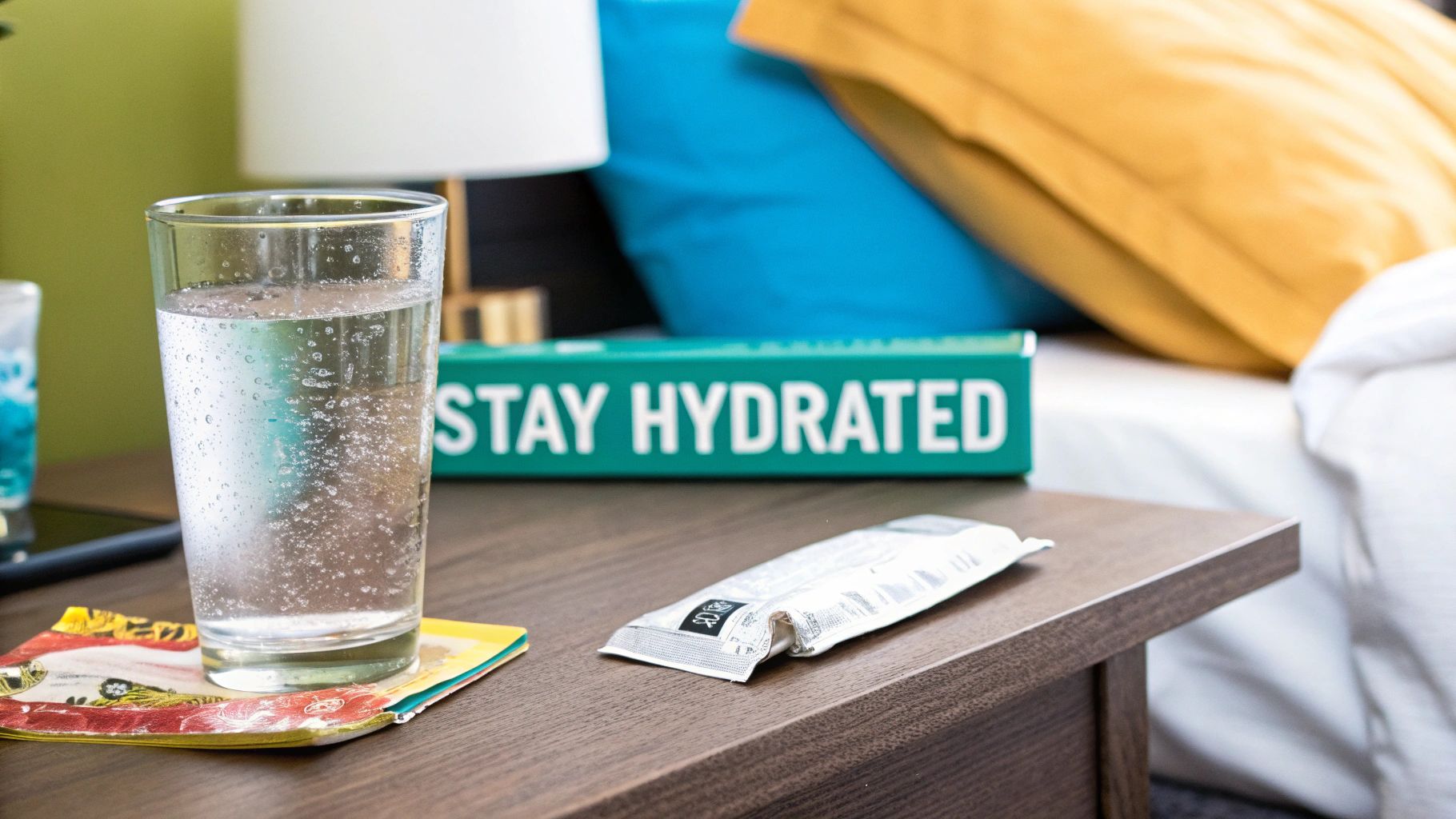

· By Annemarie
Dehydration After Drinking Alcohol: How to Prevent & Recover
Ever found yourself wondering why a night of drinking can leave you feeling like you’ve been stranded in the desert? It’s a pretty universal feeling. The simple answer is that alcohol is a diuretic, which is just a technical way of saying it makes your body push out more fluid than you're actually taking in.
This diuretic effect is the main culprit behind that intense thirst, headache, and fatigue that signals dehydration after drinking alcohol.
Why Alcohol Drains Your Body of Water
So, how does this actually happen? Think of your body as having a very important hormonal manager called ADH (antidiuretic hormone). ADH's entire job is to keep your body's water levels perfectly balanced. It tells your kidneys when to conserve water and when it’s okay to let some go.
When you introduce alcohol into the mix, it’s like sending that hormonal manager on an unexpected vacation. Alcohol suppresses the release of ADH, and without its instructions, the floodgates open. Your kidneys go into overdrive, flushing out water at a much faster rate than usual, which explains all those extra trips to the restroom. The end result? A serious net loss of fluids that leads straight to dehydration.
The Hormonal Disruption Behind Dehydration
This hormonal interference is really the heart of the issue. It creates a domino effect where your body is losing far more water than it's absorbing, no matter how much liquid you think you're drinking. For every standard drink you have, your body can expel up to four times as much fluid. Yikes.
This simple chain reaction is the direct path from that first sip to feeling the classic symptoms of dehydration.
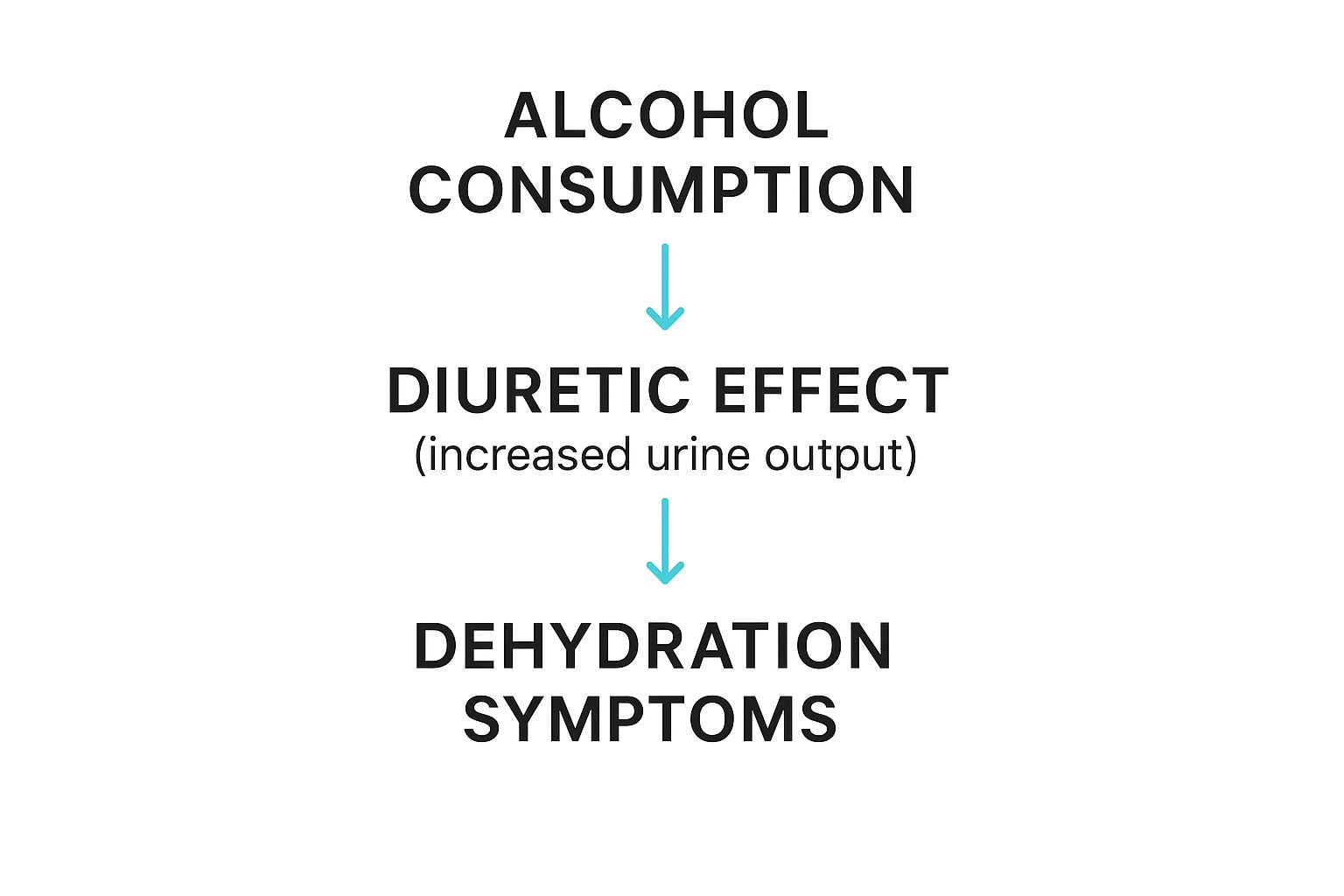
As you can see, alcohol’s diuretic effect is what kicks off all those uncomfortable signs of fluid loss. It's also why just chugging plain water the next morning often isn't a quick fix. Your body isn't just low on H2O; it's also been stripped of essential electrolytes like potassium and sodium that got flushed out right along with it.
How Alcohol Triggers Dehydration
Here’s a quick look at the chain reaction alcohol sets off in your body, leading to significant fluid loss and the classic signs of a hangover.
| The Cause | What Happens in Your Body | The Resulting Feeling |
|---|---|---|
| You have a drink | Alcohol enters your bloodstream and reaches the brain. | A feeling of relaxation or a "buzz." |
| Hormone suppression | Alcohol blocks the release of the antidiuretic hormone (ADH). | You don't notice any change at this stage. |
| Kidneys go into overdrive | Without ADH's signal, your kidneys start flushing water out. | More frequent trips to the bathroom. |
| Fluid and electrolyte loss | Your body expels far more liquid than you're taking in. | Thirst, dry mouth, headache, fatigue, and dizziness set in. |
It’s a straightforward but powerful process that can leave you feeling rough if you’re not prepared.
Studies have confirmed that even a moderate amount of alcohol can cause a noticeable drop in your hydration levels. This problem gets much worse if you're not drinking water alongside your cocktails. To get a more detailed breakdown of the science, you can find out more about the surprising reasons why alcohol dehydrates you in our deep-dive article.
Understanding this process is the first step to recognizing the symptoms and, more importantly, learning how to fight back.
Recognizing the Signs of Alcohol Dehydration
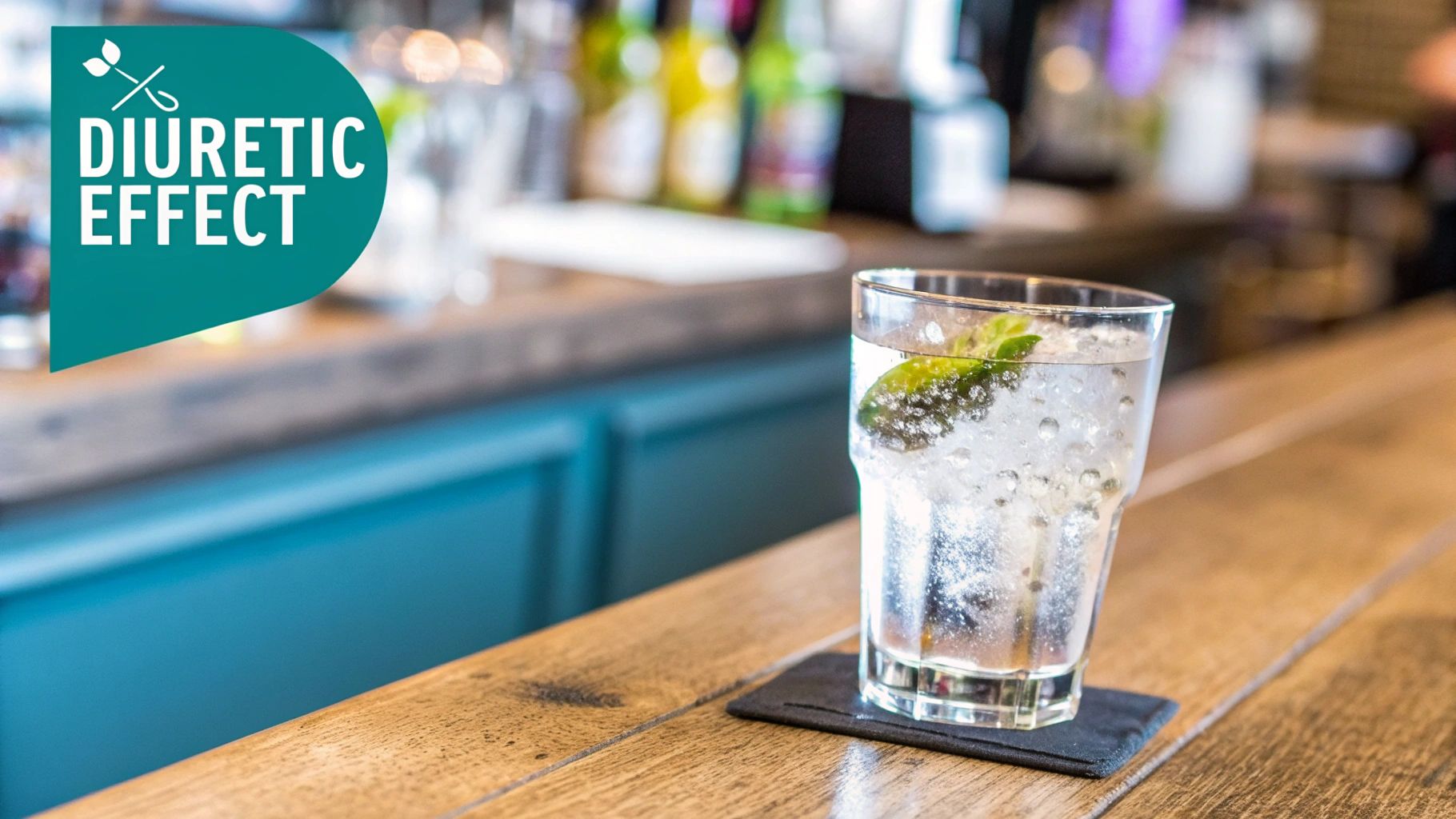
That pounding headache and sandpaper-dry mouth the morning after aren't just random pains. They’re your body’s alarm bells, screaming that you’re dealing with dehydration after drinking alcohol. Learning to spot these signals is the first step toward a much, much better morning.
It's easy to write these feelings off, but they're a direct response to a serious fluid shortage. It’s wild, but even a 2% drop in your body's water levels is enough to bring on fatigue, dizziness, and that all-too-familiar headache. When you consider that an estimated 75% of American adults are walking around chronically dehydrated on a normal day, it's clear how a night of drinking can fast-track the problem. You can dig deeper into how widespread dehydration is on quench.culligan.com.
Early Warning Signs to Watch For
Your body usually gives you a heads-up before things get really bad. Think of it as a quick body check-in. Paying attention to these early, milder signs can help you get ahead of the game before you're down for the count.
These symptoms are your body’s way of saying, “Hey, I could use some help here.”
- That Insatiable Thirst and Dry Mouth: This one’s the most obvious. Your body is practically begging for water because its reserves are running on empty.
- Feeling Sluggish and Tired: Dehydration actually reduces blood flow to your brain, which is why you feel so drained and totally unmotivated.
- Dark-Colored Urine: A quick glance can tell you a lot. If it's not a pale, straw-like color, you're not hydrated enough. Dark yellow or amber is a definite red flag.
- A Nagging Headache: When you're low on fluids, your brain can literally shrink away from your skull, causing that throbbing pain. Ouch.
Key Takeaway: The signs of alcohol-induced dehydration usually start small. If you notice you're unusually tired or your pee looks dark, you can start rehydrating before the really nasty symptoms kick in.
When Dehydration Becomes More Serious
If you ignore those first few whispers from your body, it will eventually start shouting. These more severe symptoms mean your body is under some serious strain and needs immediate attention to get its fluid balance back on track.
You might feel a rapid heartbeat or palpitations—that’s your heart working overtime to pump thicker blood around your body. You could also get hit with dizziness or lightheadedness, especially when you stand up too fast, which signals a drop in blood pressure. In really bad cases, you might feel confused or irritable, since brain function takes a direct hit without enough water. These are not signs you want to ignore.
The Hidden Dangers of Repeated Dehydration
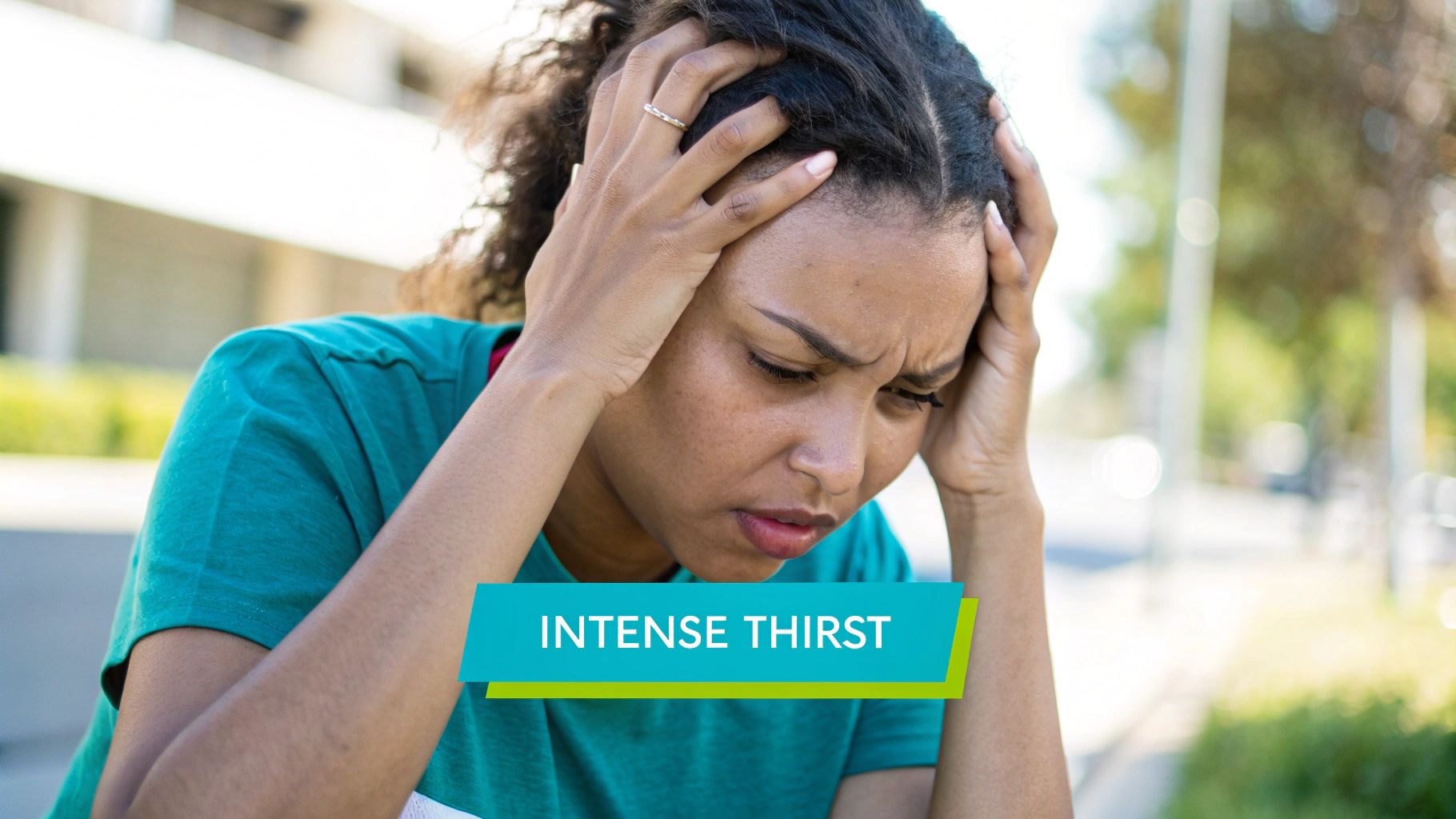
We've all been there—a rough morning after a fun night out. But what happens when that post-drinking dehydration becomes a regular thing? The occasional hangover feels like a temporary problem, but when you’re constantly putting your body through that cycle, it can quietly chip away at your long-term health.
Think of it like running a high-performance engine without enough oil. Sure, it'll run for a bit, but over time, parts start to wear down way faster than they should. This is about more than just feeling lousy for a day; it’s about the cumulative damage that can lead to some pretty serious issues down the road.
The Toll on Your Kidneys and Heart
Your kidneys are basically your body’s elite filtration system, working 24/7 to clean your blood. When you're chronically dehydrated, you’re forcing them to work overtime in a much thicker, more concentrated environment. This ramps up the risk for painful kidney stones and UTIs and, over time, can seriously impair their overall function.
But the strain doesn't stop with your kidneys. Your heart takes a direct hit, too. Dehydration makes your blood thicker, which means your heart has to pump much harder just to keep everything circulating. This can lead to a racing heart rate and even palpitations.
Dehydration is a huge health issue tied to alcohol use across the globe. In the U.S. alone, it’s responsible for around 1% to 3% of all hospital admissions, with a ton of those cases being kicked off or made worse by drinking. You can get more details on the clinical impacts of dehydration from ncbi.nlm.nih.gov.
On top of all that, alcohol-induced dehydration flushes out essential electrolytes—we're talking about minerals like potassium and sodium that your body absolutely needs to work right.
These electrolytes are crucial for:
- Keeping your nerves firing properly so your brain and body can communicate.
- Regulating muscle contractions, including the all-important rhythm of your heartbeat.
- Balancing your body's pH levels to keep everything running smoothly.
When these minerals are out of whack, it can mess with your heart's electrical signals, potentially leading to arrhythmias or an irregular heartbeat.
Cognitive Function and Brain Health
Here's a wild stat: your brain is about 75% water. That makes it incredibly sensitive to your hydration levels. When you’re dehydrated, your brain cells literally lose water and shrink a bit. This is a huge reason for the "brain fog," confusion, and irritability that tag along with a hangover.
If you’re repeatedly putting your brain through that, it can start to affect your cognitive abilities long-term, messing with your memory, focus, and decision-making skills.
Protecting your brain isn't just about dodging a headache. It's about making sure it stays sharp and functions at its best. Thinking of hydration as a core part of self-care, rather than just a hangover cure, is a total game-changer. It’s a proactive way to protect your long-term wellness from the inside out.
Your Proactive Hydation Plan for a Better Morning
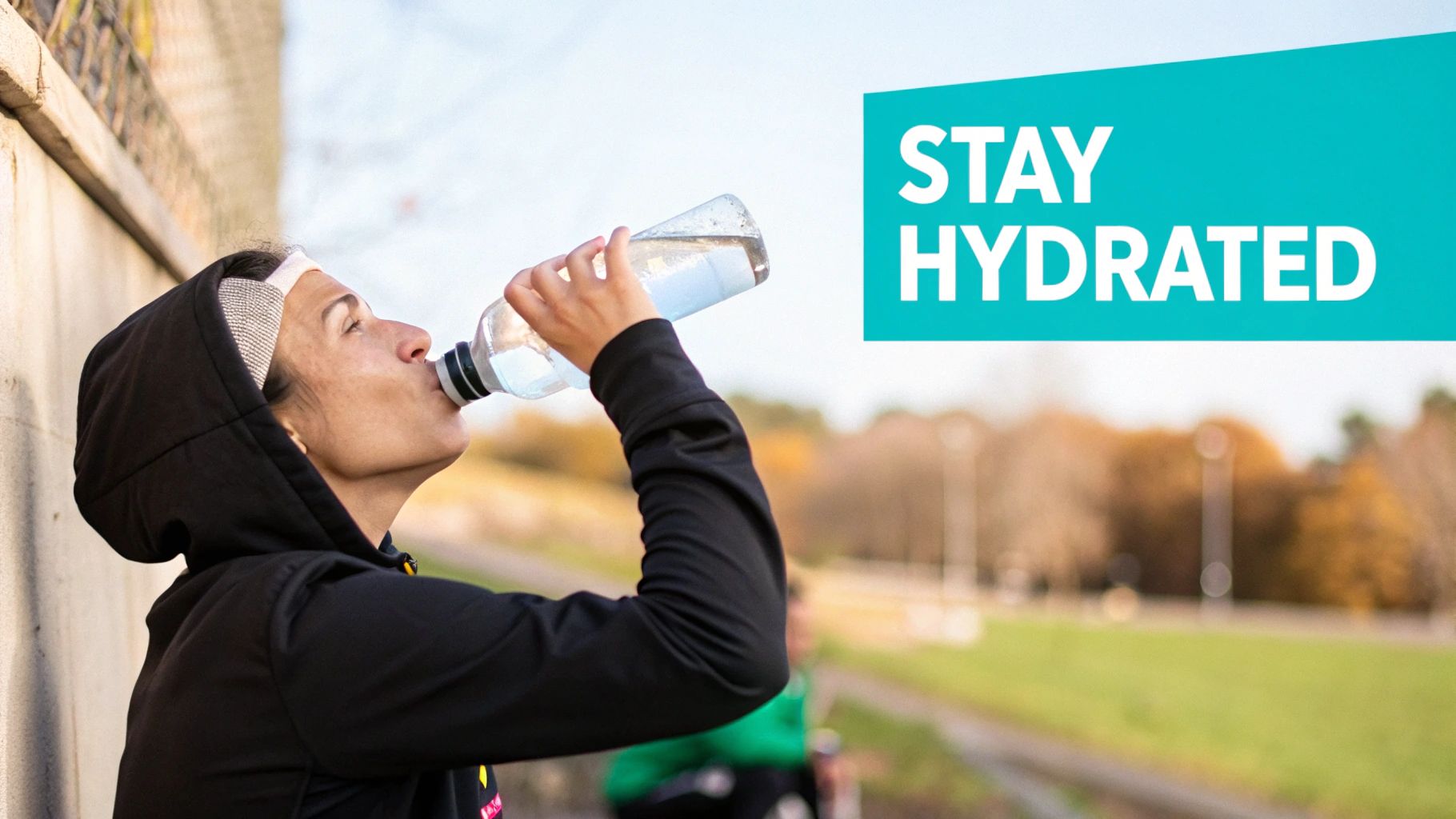
Let's be real: the best way to deal with dehydration after drinking alcohol is to not let it happen in the first place. A little proactive planning is your secret weapon against a rough morning. Think of it as your pre-game strategy. This isn't about following a bunch of complicated rules, just a few smart habits.
Picture your body as a sponge. It’s way easier to keep a sponge damp with a steady trickle of water than to try and rehydrate it once it's totally dried out and crusty, right? It's the same with your body. Starting to hydrate long before you even think about having your first drink gives you a reservoir to pull from when alcohol starts doing its thing.
That means sipping water throughout the day, not just chugging a glass right before you walk out the door. A well-hydrated body is just a more resilient body.
Set Yourself Up for Success Before You Go
What you do in the hours leading up to a night out can honestly make or break your next morning. Fueling up the right way can seriously slow down how fast your body absorbs alcohol, helping you hold onto those crucial fluids and nutrients.
A solid pre-drinking meal is a total non-negotiable. Aim for a balanced plate with some protein, healthy fats, and complex carbs. This combo slows down the rate that alcohol hits your bloodstream, which gives your body a fighting chance to process it without getting overwhelmed.
Pro Tip: Eating a meal that's rich in electrolytes before you start drinking is a total game-changer. Foods like bananas (potassium), yogurt (sodium and potassium), and avocados (potassium) help stock up your body's reserves before the alcohol even has a chance to flush them out.
Make Smarter Choices While You're Out
The drinks you choose and how you pace yourself during the night play a massive part in how you'll feel tomorrow. The classic “one glass of water for every alcoholic drink” rule is a great starting point, but you can level up with a few more tricks:
- Ditch the Sugary Mixers: Drinks loaded with sodas, juices, and sugary syrups can actually speed up dehydration. Plus, they're often the culprit behind a killer headache. Go for soda water or a splash of fresh citrus instead.
- Choose Lower-Proof Options: Drinks with a lower alcohol by volume (ABV), like a light beer or a wine spritzer, aren’t as harsh on your system as high-proof liquors. Less alcohol means a less powerful diuretic effect.
- Pace Yourself: This one’s simple but so important. Give your body time to metabolize what you're drinking. When you rush your drinks, you're just fast-tracking dehydration. Seriously, slowing down is one of the easiest and most effective ways to feel human the next day.
Building these little habits can make all the difference. For an even deeper dive, check out our guide on how to avoid a hangover after drinking with top tips to try.
How to Effectively Rehydrate and Bounce Back
Waking up after a fun night out feeling… well, not so fun… is your body’s not-so-subtle way of telling you it needs a solid recovery plan. Your first instinct might be to grab the biggest glass you own and start chugging water. But that’s a bit like trying to put out a forest fire with a garden hose.
The real story is that effective rehydration isn't just about replacing the water you've lost. It’s about restoring the delicate balance that a few drinks can so easily throw out of whack.
When you're dealing with dehydration after drinking alcohol, your body is craving more than just H2O. It’s also been stripped of vital electrolytes like potassium and sodium, which are the unsung heroes of fluid absorption and muscle function. This is exactly why plain water often doesn't cut it—your body just can't hold onto it without those key minerals to help.
Why Electrolytes Are Your Best Friend
Think of electrolytes as the bouncers for your cells. Without them on the list, water can’t get past the velvet rope and into the party where it’s actually needed. This is why reaching for something with a bit more nutritional firepower is a much smarter move.
- Coconut Water: Often called nature’s sports drink for a reason. It's loaded with potassium, which helps with everything from muscle cramps to getting your fluid levels back in check.
- Oral Rehydration Solutions: These aren't just for sick days. They’re scientifically formulated with the perfect ratio of sodium, potassium, and glucose to help your body absorb fluids fast.
- Broth-Based Soups: A warm bowl of soup does more than just soothe your soul. It’s a great way to replenish sodium and fluids, helping you feel a little more human again.
These options work because they tackle the real problem: it's not just about fluid loss, it's about nutrient loss, too. They give your body the complete toolkit it needs to start rebuilding from the inside out.
A Look at Your Rehydration Options
Choosing the right recovery method can make all the difference between bouncing back quickly and writing off the entire day. Here’s a quick comparison to help you pick the smartest strategy.
| Rehydration Method | How It Helps | When to Use It | What to Watch For |
|---|---|---|---|
| Plain Water | Basic hydration | Throughout the night and the next day | Might not be enough on its own; can flush out remaining electrolytes. |
| Sports Drinks | Replaces electrolytes and provides sugar for energy | If you need a quick boost of energy and electrolytes | Often high in sugar and artificial ingredients. |
| Coconut Water | Natural source of potassium and other electrolytes | A great natural alternative to sports drinks | Look for unsweetened versions to avoid added sugars. |
| Targeted Formulas (like Upside) | A precise blend of electrolytes, vitamins, and antioxidants | Before bed or first thing in the morning for maximum effect | Choose products with high-quality, transparent ingredients. |
Ultimately, a targeted approach is going to get you back on your feet faster because it's specifically designed to counteract what alcohol took away.
A Targeted Approach to Recovery
While general remedies are good, a more focused approach can seriously speed up your bounce-back time. This is where products like Upside Hangover Sticks really shine. They're engineered to go head-to-head with alcohol's effects, delivering a precise blend of electrolytes, vitamins, and antioxidants.
Instead of just winging it, these formulas give your body a direct infusion of the exact nutrients that alcohol depletes. For example, they often include B vitamins to kickstart your energy metabolism and amino acids like L-cysteine to help your liver process alcohol’s nasty byproducts.
It's a complete game plan that tackles dehydration, nutrient depletion, and metabolic stress all at once. For a deeper dive into the science, check out our guide on the best way to rehydrate after drinking with proven tips.
Key Insight: Strategic rehydration means giving your body exactly what it lost. A targeted solution with electrolytes and vitamins works faster and more effectively than plain water because it restores the essential minerals needed for true cellular hydration and recovery.
By choosing a smarter way to rehydrate, you’re not just quenching your thirst. You’re actively helping your body find its equilibrium, refuel its energy stores, and get you back on your feet so you can feel like yourself again—without losing your entire day to the couch.
Your Burning Questions About Alcohol and Dehydration, Answered
Let's clear the air on some of the biggest points of confusion around drinking, hydration, and that awful next-day feeling. When it comes to dehydration after drinking alcohol, there's so much conflicting advice floating around. I'm here to cut through the noise and give you the real, science-backed answers to help you handle your next night out a little smarter.
We're going to move past the old myths and get down to what’s actually happening inside your body when you drink.
How Much Water Should I Actually Be Drinking?
That old "one-for-one" rule—a glass of water for every alcoholic drink—is a solid place to start. It’s easy to remember, and it absolutely helps. But let's be real, it's not a magic fix. Not all drinks are created equal, and neither are we.
Think of your body as its own unique ecosystem. The strength of your cocktail, how fast your metabolism is humming, and even the dinner you had beforehand all play a role in how quickly you get dehydrated. A stiff whiskey on the rocks is going to hit your system a lot harder than a light beer.
The Real Goal: Forget just counting glasses. The best thing you can do is learn to listen to your body. Pay attention to those early nudges like feeling thirsty, a dry mouth, or noticing your urine is a darker yellow. These are your body's most honest signals telling you it's time to chug some water, no matter how many drinks you've had.
Do Electrolytes Really Make a Difference?
Oh, absolutely. You could even argue they're just as crucial as water for bouncing back. When alcohol sends you to the bathroom over and over, you’re losing more than just H2O. You're also flushing out essential minerals called electrolytes.
And these aren't just some buzzword from a sports drink commercial; they're vital for getting your body back on track.
- Sodium: Think of sodium as the gatekeeper for your cells. It's the master of fluid balance, helping your cells actually absorb and hold onto the water they're begging for.
- Potassium: This one is a big deal for muscle function and nerve signaling. Ever feel weak, shaky, or achy during a hangover? A lack of potassium is a major reason why.
When these minerals are running low, your body just can't rehydrate properly, no matter how much water you down. Replenishing them is a non-negotiable step if you want to kick the fatigue, headache, and that general feeling of misery. This is exactly why things like bananas and electrolyte drinks work so well.
Does the Type of Alcohol I Drink Matter?
You bet it does. It makes a huge difference, actually. The kind of drink you choose can either put the dehydration process into overdrive or help pump the brakes a little. Knowing the difference can help you make way better choices.
First up, the alcohol concentration. High-proof liquors like vodka, gin, and whiskey have a much stronger diuretic effect simply because there’s more alcohol in every single sip. That means they suppress your ADH (the hormone that tells your body to hold onto water) more aggressively, leading to faster fluid loss.
Second, be very wary of sugary mixers. Cocktails loaded with soda, sweet juices, or tonic water can make you feel even worse. Why? Your body has to use extra water just to process all that sugar, pulling even more precious fluid out of your system. That combo turns a few innocent-looking cocktails into a one-way ticket to a splitting headache and raging thirst. Sticking to drinks with less sugar and a lower alcohol content is one of the kindest things you can do for your body—and for your morning self.
Don't leave your next day to chance. With Upside Hangover Sticks, you get a scientifically formulated blend of electrolytes, vitamins, and antioxidants designed to directly combat the effects of alcohol. Simply take one before bed or first thing in the morning to help your body rehydrate, replenish, and recover faster. Feel your best and get back to your life by visiting https://enjoyupside.com.
